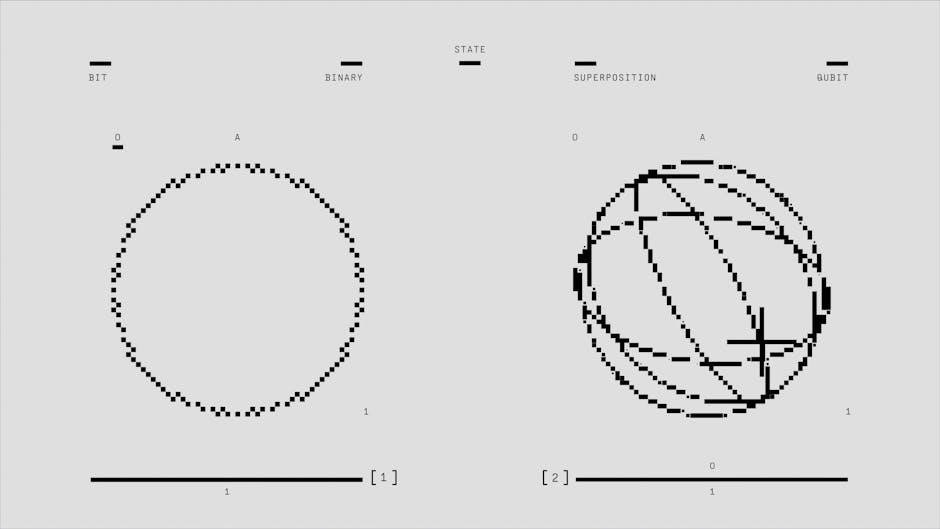Welcome to the fascinating world of quantum theory! This guide simplifies complex concepts for newcomers. Explore the basics, key principles, and practical applications. Start your journey with resources like Quantum Physics for Dummies and gain foundational knowledge. No advanced math required—just curiosity and enthusiasm!

What is Quantum Theory?
Quantum theory is a fundamental branch of physics that explores the behavior of matter and energy at the smallest scales, such as atoms and subatomic particles. It challenges classical physics by introducing concepts like wave-particle duality, where particles can behave as both waves and particles. Developed by pioneers like Max Planck and Albert Einstein, quantum theory explains phenomena that classical physics cannot, such as the quantization of energy and the probabilistic nature of physical events. At its core, quantum theory describes the world in terms of probabilities rather than definite outcomes, a concept central to quantum mechanics. This theory has revolutionized our understanding of reality, leading to breakthroughs in technology, including semiconductors, lasers, and MRI machines. For beginners, resources like Quantum Physics for Dummies provide an accessible introduction to these groundbreaking ideas. By studying quantum theory, you’ll uncover the fascinating rules that govern the microscopic universe and how they shape our modern world.

Basic Principles of Quantum Theory
Quantum theory is built on several core principles that define how the microscopic world operates. One key principle is wave-particle duality, where particles like electrons exhibit both wave-like and particle-like behavior. Another fundamental concept is quantization, which states that certain properties, such as energy, come in discrete packets called quanta rather than being continuous. The uncertainty principle, introduced by Werner Heisenberg, asserts that it’s impossible to simultaneously know both the position and momentum of a particle with absolute precision. Additionally, superposition allows particles to exist in multiple states at once until measured. These principles are governed by probabilities rather than definite outcomes, a concept central to quantum mechanics. The Planck constant plays a crucial role in linking energy and frequency, forming the basis of quantum calculations. For beginners, understanding these principles is essential to grasping how quantum theory challenges classical physics and explains phenomena at the atomic and subatomic level. Resources like Quantum Physics for Dummies provide a clear introduction to these foundational ideas.

Key Concepts in Quantum Mechanics
Quantum mechanics introduces several groundbreaking concepts that redefine our understanding of reality. The wave function, described by the Schrödinger equation, is central to predicting the probabilities of a particle’s behavior. Superposition allows particles to exist in multiple states simultaneously, while entanglement links particles across vast distances, enabling instantaneous correlations. The Heisenberg Uncertainty Principle limits our ability to measure certain pairs of properties, such as position and momentum, simultaneously with high precision. Quantization explains why energy levels are discrete, and the Pauli Exclusion Principle prevents identical particles from occupying the same quantum state. Another crucial idea is Von Neumann entropy, which measures quantum information and system disorder. For beginners, resources like Quantum Computing for Dummies and Quantum Physics for Dummies provide accessible explanations of these concepts. Understanding these ideas is essential to grasping how quantum mechanics challenges classical physics and opens doors to revolutionary technologies. These principles form the backbone of quantum theory, making it a fascinating and powerful framework for understanding the universe.
Recommended Resources for Learning Quantum Theory
Embarking on a journey to learn quantum theory? Start with Quantum Physics for Dummies by Steven Holzner, a beginner-friendly guide requiring only basic math skills. For a deeper dive, explore Quantum Computing for Dummies, which demystifies quantum computing’s potential. John Preskill’s work on quantum information theory, including discussions on Von Neumann entropy, is another valuable resource. Visit www.dummies.com for cheat sheets and additional materials. These resources simplify complex concepts like superposition and entanglement, making quantum theory accessible to all. Whether you’re a student or a curious learner, these books and online tools provide a solid foundation for understanding quantum mechanics and its applications.
Quantum Mechanics vs. Quantum Physics: Understanding the Difference
Quantum mechanics and quantum physics are often used interchangeably, but they have distinct focuses. Quantum mechanics is the theoretical framework describing the behavior of matter and energy at the smallest scales, using mathematical formulations. It explores principles like wave-particle duality, superposition, and entanglement. On the other hand, quantum physics encompasses the broader scope of experimental and practical applications, including technologies like lasers and semiconductors. While quantum mechanics provides the theoretical foundation, quantum physics applies these principles to real-world phenomena. Understanding this distinction helps clarify how the theory translates into practical innovations. For beginners, resources like Quantum Physics for Dummies often blend both concepts, making the learning process seamless. The difference lies in their focus: mechanics is the “why,” while physics is the “how” and “what.” Grasping this nuance enhances your appreciation of quantum theory’s depth and applications.
Quantum information theory bridges quantum mechanics and information science, exploring how quantum systems process and transmit data. It introduces concepts like qubits, quantum entanglement, and superposition, which enable advanced computing and secure communication. This field revolutionizes data handling, offering solutions beyond classical capabilities. For beginners, resources like Quantum Computing for Dummies provide accessible explanations, making complex ideas understandable. Understanding quantum information theory opens doors to innovations in cryptography, error correction, and more, shaping the future of technology.
Quantum Computing for Dummies: A Beginner’s Guide
Quantum computing is a revolutionary technology that leverages the principles of quantum mechanics to perform calculations beyond classical computers’ capabilities. For beginners, understanding qubits—quantum bits—is essential. Unlike classical bits, qubits can exist in multiple states simultaneously due to superposition and entanglement. These properties enable quantum computers to solve complex problems efficiently in cryptography, optimization, and AI. Quantum Computing for Dummies is an excellent resource for newcomers, breaking down intricate concepts into digestible language. It covers the basics of quantum systems, quantum gates, and algorithms without requiring advanced mathematical knowledge. This guide emphasizes practical applications, such as quantum cryptography and error correction, making it ideal for those eager to explore this transformative field. By mastering the fundamentals through this guide, you’ll gain a solid foundation to delve deeper into quantum computing’s potential to revolutionize technology and problem-solving.

Implications and Applications of Quantum Theory
Quantum theory has profound implications across various fields, revolutionizing technology and our understanding of the universe. Its applications are vast, from quantum computing and cryptography to materials science and medicine. Quantum computers leverage qubits to solve complex problems exponentially faster than classical computers, transforming industries like finance and logistics. Quantum cryptography offers ultra-secure communication, crucial for data protection. In materials science, quantum principles help design new materials with unique properties, such as superconductors and nanomaterials. Medical advancements include improved MRI technology and drug discovery through quantum simulations. The quantum internet is another emerging application, promising secure communication networks. These innovations highlight quantum theory’s transformative potential, making it a cornerstone of modern technological progress. As research advances, quantum theory continues to unlock new possibilities, shaping the future of science and engineering.
Quantum theory is not just a abstract concept—it deeply influences our daily lives and future technologies. Its principles underpin modern advancements like semiconductors, lasers, and MRI machines. Quantum computing promises to solve problems currently deemed unsolvable, while quantum cryptography ensures ultra-secure communication. Beyond technology, quantum theory reshapes our understanding of reality, challenging classical physics and sparking philosophical debates. For beginners, resources like Quantum Physics for Dummies provide accessible entry points, proving that complex ideas can be understandable. As research progresses, quantum theory’s implications grow, offering solutions to global challenges in energy, medicine, and more. Embracing this knowledge empowers us to contribute to a future driven by innovation. Quantum theory matters because it bridges the gap between scientific curiosity and practical revolution, shaping tomorrow’s world.
Further Reading and Study Materials

If you’re eager to dive deeper into quantum theory, there are excellent resources available. Books like Quantum Physics for Dummies by Steven Holzner provide a clear, beginner-friendly introduction, requiring only basic math skills. For those interested in computing, Quantum Computing for Dummies offers a comprehensive guide to understanding this emerging field. Online platforms like www.dummies.com are treasure troves of supplementary materials, including cheat sheets and user tips. Additionally, courses and tutorials on quantum information theory, such as those discussed by J. Preskill, can enhance your understanding of concepts like Von Neumann entropy. Videos and podcasts, such as “Quantum Physics for Dummies: A Quick Crash Course!” by Andrea Schulman, offer engaging ways to grasp complex ideas. These resources ensure that learning quantum theory is both accessible and enjoyable, making it easier to explore the fascinating world of quantum mechanics and its applications.
